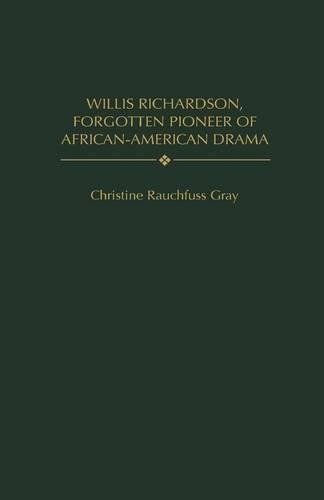
Willis Richardson, Forgotten Pioneer of African-American Drama
(Hardback)
Publishing Details
Willis Richardson, Forgotten Pioneer of African-American Drama
By (Author) Christine R. Gray
Bloomsbury Publishing PLC
Praeger Publishers Inc
30th December 1999
United States
Classifications
Tertiary Education
Non Fiction
Literary studies: plays and playwrights
Literary studies: c 1900 to c 2000
812.52
Physical Properties
Hardback
160
Description
During the 1920s and 1930s, Willis Richardson (1889-1977) was highly respected as a leading African-American playwright and drama anthologist. His plays were performed by numerous black high school, college, and university drama groups and by theater companies in Chicago, New York, Washington D.C., Cleveland, Baltimore, and Atlanta. With the opening of The Chip Woman's Fortune (1923), he became the first African American to have a play produced on Broadway. Several of his 46 plays were published in assorted magazines, and in his essays, he urged black Americans to seek their dramatic material in their own lives and circumstances. In addition, he edited three anthologies of plays by African-Americans. But between 1940 and his death in 1977, Richardson came to realize that his plays were period pieces and that they no longer reflected the problems and situations of African-Americans. In the years before his death, he attempted vigorously yet unsuccessfully to preserve several of his plays through publication, if not production. But the man who has been called the father of African-American drama and who was considered the hope and promise of African-American drama died in obscurity. Richardson has even been neglected by the scholarly community. This critical biography, the first extensive consideration of his life and work, firmly reestablishes his pioneering role in American theater. The book begins with a detailed chronology, followed by a thoughtful biographical essay. The volume then examines the nature of African-American drama in the 1920s, the period during which Richardson was most productive, and it analyzes his approach to drama as a means of educating African-American audiences. It then explores the African-American community as the central theme in Richardson's plays, for Richardson typically looks at the consequences of refusals by blacks to help one another. The work additionally considers Richardson's history plays, his anthologies, his dramas intended for black children, and his essays. A concluding chapter summarizes his lasting influence; the book closes with a listing of his plays and an extensive bibliography.
Reviews
Gray's excellent biography firmly locates Richardson in his Washington, DC, milieu, pointing out along the way how scholarly studies of the Harlem Renaissance continue to overlook other important sites of African American cultural production. Working with unpublished autobiographical material, interviews with Richardson's family, and Richardson's published and unpublished writing, Gray paints a rich, meticulously detailed portrait of the scope of Richardson's career. Written in clear and engaging prose, this groundbreaking study should help to introduce Richardson to a new generation of readers. US literature and culture at all levels; also a welcome addition to public collections.-Choice
"Gray's excellent biography firmly locates Richardson in his Washington, DC, milieu, pointing out along the way how scholarly studies of the Harlem Renaissance continue to overlook other important sites of African American cultural production. Working with unpublished autobiographical material, interviews with Richardson's family, and Richardson's published and unpublished writing, Gray paints a rich, meticulously detailed portrait of the scope of Richardson's career. Written in clear and engaging prose, this groundbreaking study should help to introduce Richardson to a new generation of readers. US literature and culture at all levels; also a welcome addition to public collections."-Choice
Author Bio
CHRISTINE RAUCHFUSS GRAY is Assistant Professor of English at Catonsville Community College. She has contributed to the Cambridge Companion to American Women Playwrights (1997) and is the author of the critical introduction to the facsimile edition of Plays and Pageants in the Life of the Negro (1993).
